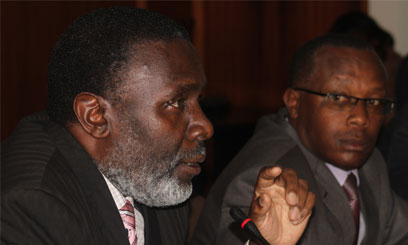
In this case the facilities were to receive Sh2,850 per member per year to offer outpatient services/CFM
Vice Chair Kanyenje Gakombe told the Parliamentary Committee on Health that the mistake the national insurer made was to start the scheme before enlisting service providers.
He said they had held several meetings with Medical Services Minister Anyang’ Nyong’o and the NHIF board to advice on the same prior to introduction of the scheme but failed to reach any conclusions.
“NHIF put the cart before the horse. Ordinarily if you are starting a service, you set up your service infrastructure then you go and look for customers. Civil Servants were signed up when negotiations with providers were still ongoing. There was no provider network to talk about at the time that the scheme was being signed up. What there was is the existing service providers for NHIF whose scope was limited to inpatient,” Gakombe explained.
He went on to say that the reason why most private hospitals refused to sign up to the outpatient scheme was because of the capitation model that was to be used in payment.
Capitation is a system where a health facility is given a fixed amount of money by the insurer to offer services.
“Whereas civil servants were being told you have all this unlimited service, providers were being given a financial cap as to the maximum amount of money they could receive per member. That meant two possible scenarios. The first was take the money because it is in advance and then restrict services so that you can try and go throughout the year with no further funding and I (service provider) actually make the most profit when nobody turns up,” he stated.
In this case the facilities were to receive Sh2,850 per member per year to offer outpatient services.
However, some of the private hospitals said this was not adequate and demanded for between Sh6,000 and Sh9,000 according to Gakombe.
“It is almost impossible to quote for outpatient services without a scope of the services that you are expected to quote for because outpatient services could even include day surgery, they could be limited to consultation and dressing so we found it very hard to give any form of financial proposal to NHIF,” he told the Parliamentary Committee that is probing irregular allocation of funds to ghost and non-existent clinics.
The civil servants were expected to receive unlimited inpatient and outpatient services after joining the scheme which began in January.
“The truth of the matter is that the first limitation civil servants were going to experience was being tied to only one provider and there are many ways of limiting access to medical cover,” Gakombe said adding that this limited the members to the capacity of that particular service provider.
Gakombe proposed a review of the amount offered to hospitals and also said that there needed to be a strong system to ensure that members got quality service that they were entitled to even under capitation model of payment.
“In the absence of a very strong and aggressive quality assurance system, capitation simply puts money into the pockets of service providers without guaranteeing that they will render any service because any person who turns up in a capitated centre is actually a nuisance. You are coming to spend money, you are not welcome,” he stated.
Secretary General Peter Omboga said they were in full support of universal healthcare and believed the best way to provide it was through the NHIF but it could only work best if the national health insurer was made autonomous regulated by a Health Benefits Regulatory Authority.
“We believe it is a good idea but what we have a problem with is the roll out,” he stated during the parliamentary hearings.
The association had been instructed by the chairman of the Parliamentary Committee on Health Robert Monda to address the issue of capitation, capacity of the private service providers selected to offer outpatient services by the NHIF and make suggestions towards improvement of the scheme.









































